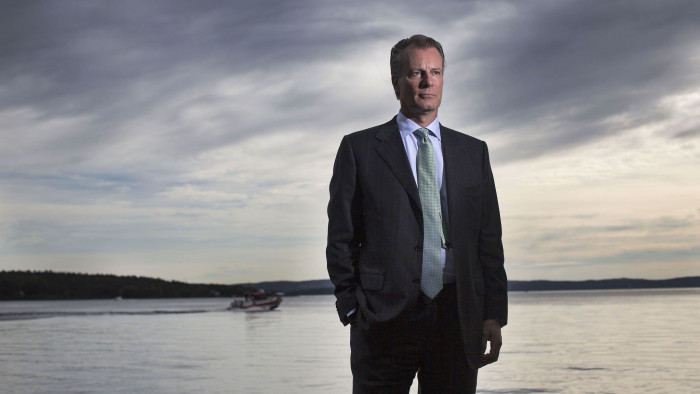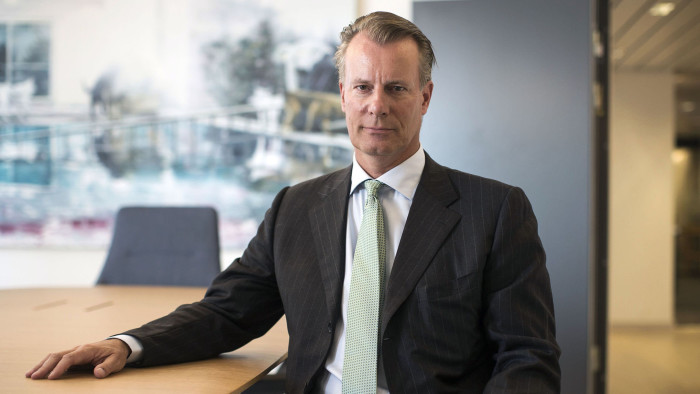Johan Andresen, chair of Norway’s Ferd, arbitrates on ethical investments for conglomerate and wealth fund

Simply sign up to the ESG investing myFT Digest -- delivered directly to your inbox.
When the coronavirus first hit Norway seriously at the end of March, billionaire investor Johan Andresen came up with a remarkable proposal for the 50 workers in his Ferd holding company: to give them NKr100,000-NKr250,000 ($10,000-$24,000) for each of their children or grandchildren to help fund the sports club or out-of-school group they attended.
In this way, Mr Andresen, a scion of a Norwegian tobacco-producing family and chair of the ethics council vetting companies in Norway’s giant sovereign wealth fund, has handed out approaching NKr20m ($1.9m) to local clubs.
“Initially, I felt sort of bewildered, that there’s thousands of things happening in my companies and I’m not on the ground,” Mr Andresen said in an outdoors interview at his family’s villa on the outskirts of Oslo. “So my initial reaction was to show empathy and to show them we have the willingness and ability to assist. It feels more fun to do it when it makes more of an impact.”
Mr Andresen may be one of Norway’s richest men but he is self-deprecating about both himself and his wealth. He does not claim to have the acumen of Berkshire Hathaway’s Warren Buffett but admires his disciplined, strategic approach. “We like to invest in companies where we think we can make a difference for a very long time,” he says.
The fifth-generation of his family to run the business, the 58-year-old Mr Andresen became chief executive of Ferd in 1998, at the same time that the family decided to sell out of the tobacco business after a 150-year presence and invest the proceeds in property, industry, and private equity.
Ferd, wholly owned by Mr Andresen and his daughters, had value-adjusted equity of NKr32.6bn ($3bn) at the end of June, making him Norway’s seventh-richest man, according to Kapital magazine. He says that without inheriting his family company, he would never have become a businessman. “I’m much more creative than I am analytical,” he adds.

Coronavirus has affected Ferd’s holdings in different ways — its ferry service Fjordline is not sailing but its food packaging and building materials companies are booming. Mr Andresen feels the group has benefited from its preparations: with the right people and sufficient cash and other liquidity, it is eyeing new opportunities for investment. At the beginning of April, it bought most of Bolist, a Swedish building materials company. Mr Andresen attributes much of the happier sort of impact to luck but paraphrases Norwegian polar explorer Roald Amundsen that “luck happens to the prepared”.
As chairman of Ferd since 2012, Mr Andresen controls investments across 14 companies — including nine private businesses and five listed ones. He says his role today is not to directly manage the group’s operating companies or investments but “to be accessible, to try to understand how people are doing and if they need some assistance, and keep in touch with people and authorities”.
He has held two calls with the leaders of all Ferd’s companies — the first was early in the crisis, focusing on how they were responding and what the holding company could do to help; the second — which took place the day before our interview in late April — concentrated on “what are you planning for? What are you looking to do differently? You see any opportunities?”
The next group management call — due later in May — will be more about the companies looking in detail at their business models and how they might change “in a more sustainable, responsible, green way”.
Ferd has been pushing its portfolio companies — which include several oil and gas service companies — to become more sustainable.
Mr Andresen’s focus on responsible investing led the Norwegian government to appoint him chairman of the Council of Ethics in 2014. This independent body looks into whether individual companies should be banned from Norway’s $1tn oil fund, the world’s largest sovereign wealth fund. The council looks for the companies that are the worst violators of international ethical norms on human rights, corruption, and environmental damage.
Last year, for instance, it recommended that the fund exclude UK security company G4S due to its poor treatment of migrant workers in Qatar and the United Arab Emirates. The work is so detailed that many other investors follow the council’s recommendations, and companies increasingly take its work seriously.
Many of the biggest exclusions from the sovereign wealth fund are determined by Norway’s parliament, which stops it owning companies that produce tobacco, nuclear weapons and cluster bombs as well as big users of coal and some oil and gas exploration companies. The Council of Ethics can recommend divesting companies for not abiding by the fund’s ethical guidelines.
Mr Andresen stresses the pragmatic merits of company leaders doing their best to avoid rebukes over their response to environmental, social and governance concerns.
“It doesn’t look good on your CV, it doesn’t look good on your share price, it doesn’t look good in your discussion with your bank or with your husband [or wife],” he says.
Comments